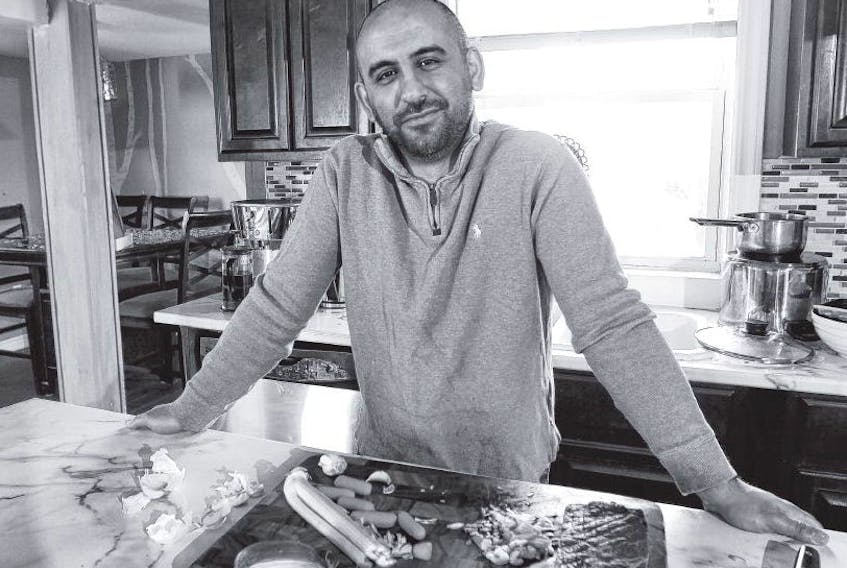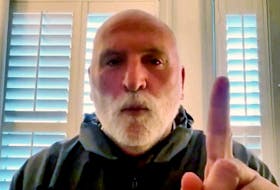A Halifax restaurant owner and Master Chef Canada finalist is speaking out about his struggle with mental illness and his treatment by his former employer, the federal government.
Andrew Al-Khouri, a Cape Breton native, owns and operates aFrite, a hip fusion restaurant on Lower Water Street that opened in late 2017. He opened the restaurant after a successful run on Master Chef Canada in 2015.
Al-Khouri also had a 12-year career with the federal government, working as a tax officer with Public Services and Procurement Canada. During that time, Al-Khouri claims his supervisor would not accommodate his severe anxiety and panic disorder and, even with medical documentation, would not approve sick leave, ultimately forcing him to resign.
“I’ve dealt with (mental illness) my entire life,” Al-Khouri told The Chronicle Herald. “I’m a very high-energy person so people see me as a happy-go-lucky kind of guy most of the time, but what you see on the face isn’t always the case.”
Al-Khouri said it was in November 2016 when he, under the advice of his physician, requested an arrangement to work from home for one to two days a week to cope with his illness.
This type of accommodation is called a telework arrangement, Al-Khouri said, and was not at all uncommon in his workplace.
After seven months of waiting, Al-Khouri said his request still wasn’t approved.
“I made a grievance saying this is an unreasonable delay and then at the time my doctor said if they’re not doing anything, I need to put you off work; you’re going to have a meltdown,” Al-Khouri said.
When he presented his medical note to management, however, Al-Khouri said he was denied.
“After I told them what the illness was, they basically scoffed at me and said, ‘You’re ridiculous, you’re not sick. How can you be sick? You’re the most lively, jokey, centre-of-attention guy,’” he said.
“My manager basically said, ‘I will not approve this, I believe you are faking,’ although he had no real reason to believe that.”
Al-Khouri noted he had what he would consider a perfect track record with his employer and had not received any prior discipline for absences.
According to Al-Khouri, his supervisor said he would consider approving the leave if he could speak to his doctor directly, something Al-Khouri wasn’t comfortable with. Instead, he provided another medical certificate with more details about his condition and treatment.
“My manager continued to refuse the medical certificate and also refused to provide me with a record of employment so I could get my EI (employment insurance),” Al-Khouri said.
During the time he was off, Al-Khouri said, he also felt harassed by his manager, who he claimed would repeatedly send him emails threatening disciplinary action if he did not return to work.
In total, Al-Khouri said he was off for five months without pay before he was forced to resign, despite providing four separate medical certificates.
“I have a mortgage; I was forced to do something,” Al-Khouri said. “I was considering opening up a business and I ended up doing it — I opened up my restaurant in December.”
Al-Khouri said he filed a grievance with his union, the Public Service Alliance of Canada (PSAC), that has gone all the way to the national level, and said his union “100 per cent” backs him.
In response to a request from the Herald, PSAC president Randy Howard confirmed Al-Khouri did file a grievance, as is the right of any member who feels the employer has contravened an article of the collective agreement. But Howard said due to privacy and confidentiality, he could not comment further.
In an emailed statement, Michèle LaRose, a spokeswoman for Public Services and Procurement Canada, said she could not comment on a particular case for privacy reasons, but she said the department makes every effort to accommodate employees on a case-by-case basis.
“PSPC complies with the Treasury Board Secretariat policy on the duty to accommodate persons with disabilities in the federal public service and, through its disability management program, assists employees who are experiencing injuries, illnesses, and disabilities, as well as their manager( s) and other stakeholders,” LaRose said.
She said sick leave is outlined in collective agreements and employees are not required to disclose medical reasons for taking sick leave. Even if the employee discloses the medical reasons, the information is not recorded in the department’s leave management system.
Halifax labour lawyer Bettina Quistgaard said issues of accommodation for illnesses and disabilities are generally handled under provincial or federal human rights legislation.
She said failing to make reasonable accommodations for an employee could be considered discriminatory unless the accommodations are such that the person is unable to perform basic job duties or they would cause undue financial hardship to the employer.
“Undue hardship is (if ) it’s just too expensive, it’s just going to be way too much money to the point it would threaten the employer’s enterprise,” Quistgaard said. “It’s a high threshold.”
Quistgaard said employers have been getting better at accommodating physical disabilities so that people can continue to do their jobs.
“Mental disability . . . there’s still a lot of stigma attached to it,” she said.
“Employers are starting to be faced with them directly and having to learn about them, but I think there’s still a big learning curve with people understanding mental disability and how it can affect someone. There’s a lack of understanding about them because it’s not something you can see.”
As for Al-Khouri, he said he will continue to stand up for himself and spread awareness surrounding mental illness.
“People need to understand that just because you’re not crying doesn’t mean you’re not suffering from some kind of mental illness,” he said. “And just because you look OK on the face doesn’t mean you don’t go home and shake at night. People don’t see everything.”









